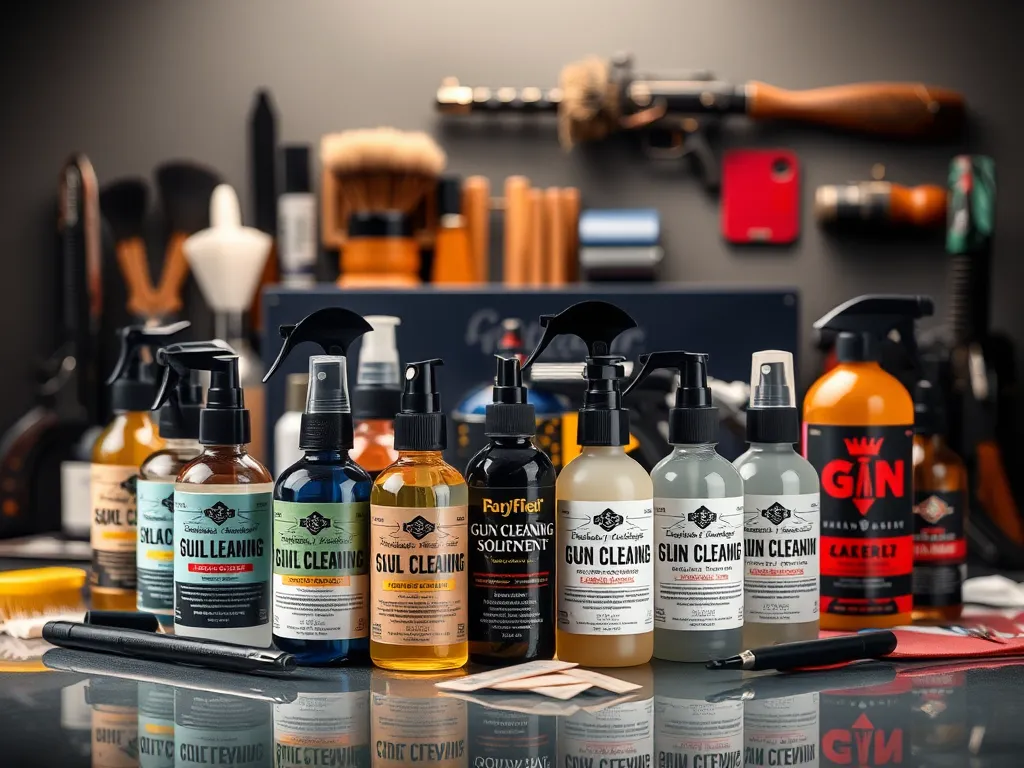The Ultimate Guide to Finding the Best Gun Cleaning Solvents

The Ultimate Guide to Gun Cleaning Solvents
Gun cleaning solvents are an essential part of firearm maintenance. Regularly cleaning your gun helps to keep it in optimal condition, ensuring it functions properly and safely. But with so many options available, choosing the right gun cleaning solvent can be overwhelming. In this article, we will explore the different types of gun cleaning solvents, key factors to consider when choosing a solvent, how to properly use solvents, best practices for cleaning guns, recommended products, and tips for maintaining your firearm.
Gun cleaning solvents come in various forms, each with its own strengths and weaknesses. It's important to understand the different types to make an informed decision about which one is best for your firearm.
Organic solvents are one of the most common types of gun cleaning solvents. These solvents are derived from natural sources such as petroleum or citrus. They are effective at removing carbon buildup and other fouling agents from the gun's internals. However, organic solvents may not be as effective at removing copper or lead buildup.
Solvent sprays are another popular option. These solvents come in aerosol cans, making application quick and easy. Solvent sprays are typically good at penetrating tight spaces and dissolving carbon buildup. However, they may not be as effective at removing copper or lead debris.
Foam solvents are a relatively newer option on the market. They come in foam form, which helps the solvent adhere to the surface for a more thorough cleaning. Foam solvents are effective at removing carbon, copper, and lead fouling. However, they may be more expensive compared to other types of solvents.
Types of Gun Cleaning Solvents
Organic solvents: Derived from natural sources such as petroleum or citrus. Effective against carbon buildup but may not be as effective against copper and lead buildup.
Solvent sprays: Come in aerosol cans for easy application. Good at dissolving carbon buildup but may not be as effective against copper and lead debris.
Foam solvents: Come in foam form for better surface adherence. Effective against carbon, copper, and lead fouling.
Synthetic solvents: Made from synthetic compounds. Can be formulated to be effective against various types of fouling agents.
Key Factors to Consider When Choosing a Gun Cleaning Solvent
1. Effectiveness against carbon buildup: Look for a solvent that effectively removes carbon fouling, as it is one of the most common types of buildup in firearms.
2. Effectiveness against copper buildup: If you shoot copper-jacketed bullets, choose a solvent that specifically targets copper fouling.
3. Effectiveness against lead buildup: For those who shoot lead bullets or use lead-based ammunition, find a solvent that can dissolve lead buildup effectively.
4. Compatibility with different firearm materials: Ensure the solvent is safe to use on various firearm materials such as steel, aluminum, or polymer.
5. Safety considerations: Consider the level of toxicity and flammability of the solvent, and follow proper safety protocols when using it.
6. Ease of use: Look for a solvent that is easy to apply and does not require excessive scrubbing or soaking.
7. Odor of the solvent: Some solvents have strong odors that may be unpleasant to work with. Choose a solvent with a tolerable odor.
8. Value for money: Consider the price of the solvent in relation to its effectiveness and quantity.
How to Use Gun Cleaning Solvents
Using gun cleaning solvents can be a straightforward process if done correctly. Here is a step-by-step guide to cleaning a gun:
1. Field-strip the firearm to access the internals that need cleaning.
2. Apply the cleaning solvent to a cleaning brush or patch, ensuring all fouled areas are covered.
3. Scrub and brush the gun using the solvent-soaked brush, paying extra attention to parts prone to fouling.
4. After scrubbing, wipe off the residue with a clean cloth or patch. Repeat the process until the cloth comes out clean.
5. Properly store the gun cleaning solvents in a cool and dry place, away from heat or open flames.
Best Practices for Cleaning Guns
1. Maintain a regular cleaning schedule for your firearm, especially after each use or exposure to harsh conditions.
2. Disassemble the gun as much as possible to access all areas that need cleaning. Follow the firearm manufacturer's instructions.
3. Avoid common cleaning mistakes such as using excessive force or aggressive chemicals that can damage the firearm.
4. Use proper cleaning tools designed for firearms to prevent scratching or other damage.
5. Pay attention to hard-to-reach areas and make sure they are thoroughly cleaned to prevent fouling or corrosion.
Recommended Gun Cleaning Solvents
Product 1: XYZ Gun Cleaning Solvent - This organic solvent is highly effective against carbon buildup and safe to use on all firearm materials.
Product 2: ABC Gun Cleaner - A solvent spray that excels at dissolving carbon fouling and has a refreshing citrus scent.
Product 3: DEF Solvent Spray - A foam solvent that clings to surfaces for targeted cleaning of carbon, copper, and lead fouling.
Tips for Maintaining Your Gun
1. Properly store your firearms in a secure and dry location, away from moisture and extreme temperatures.
2. Regularly inspect and maintain your gun for any signs of wear, rust, or damage. Address any issues promptly.
3. Clean your firearm after each use to prevent the buildup of fouling agents and ensure optimal functioning.
4. Apply lubrication to moving parts as recommended by the firearm manufacturer to reduce friction and wear.
5. Store gun cleaning solvents in a safe and secure location, away from children and unauthorized access.
